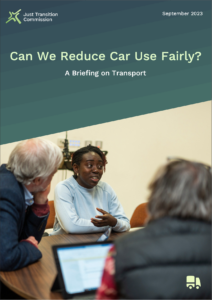To view the full content of the report, please download the PDF below.
Can We Reduce Car Use Fairly?

A Briefing on Transport
In advance of the Scottish Government publishing their sectoral just transition plan for transport, the Commission held a series of workshops and engagements in Dundee on the 12th and 13th April 2023.
The aim of the sessions was to agree advice for the Scottish Government on critical questions that will require addressing in the upcoming plan for the transport sector. The focus of the engagement activity was to investigate the justice considerations of car reduction policies.
The challenge
The Scottish Government has set a target of reducing car kilometres by 20% by 2030. The existing transport system is already highly inequitable, and rail, bus and ferry services need urgent improvements. Policies aimed at limiting car use could make this worse unless a clear, practical and affordable strategy is developed to tackle social isolation, support low-paid essential workers, expand access for people with mobility issues, and make affordable places and communities that have less need for car travel to access goods, services, amenities and facilities.
Key messages
1. A just transition for transport requires a whole systems approach.
The nature, pace and scale of the challenge requires policy action that goes well beyond piecemeal, regionally limited, or opportunistic efforts. A just transition cannot be achieved by working in silos or relying on single “silver bullet” policies when what is required is a package of policies combining “carrots” and “sticks” that will need to be carefully differentiated based on specific local and place-based needs. After decades of centralisation, a just transition for transport must be supported by strategic action in terms of spatial policy, land use planning and a new funding model capable of delivering the required investment.
2. A redistributive strategy is needed to achieve public consent for the big changes.
There are no realistic ‘win-win’ solutions available and the core just transition principle of achieving a fair distribution of costs and benefits must be applied. Revenues raised from measures such as road user charges, particularly on those on highest incomes driving SUVs and large cars, must be redistributed to achieve demonstrable benefits for public transport users and those most disadvantaged by the current transport system. There cannot be a perception that wealthy people are “getting away with it” or gaming the system if trust in the required measures is to be sustained, and a long-term public information campaign will be needed to build collective understanding of what action is being taken, how full compliance is being achieved, progress reporting, challenges and positive impacts.
3. The key risk is social isolation.
The needs of vulnerable groups must be central to decision-making through proper consultation and engagement to ensure the transport system meets the needs of disabled people, those with caring responsibilities and lower income workers particularly in socially essential fields such as social care. Policymakers should identify, and share clear steps taken to mitigate, the consistent gap between their experience as users of the transport system and the experience of those at the margins.